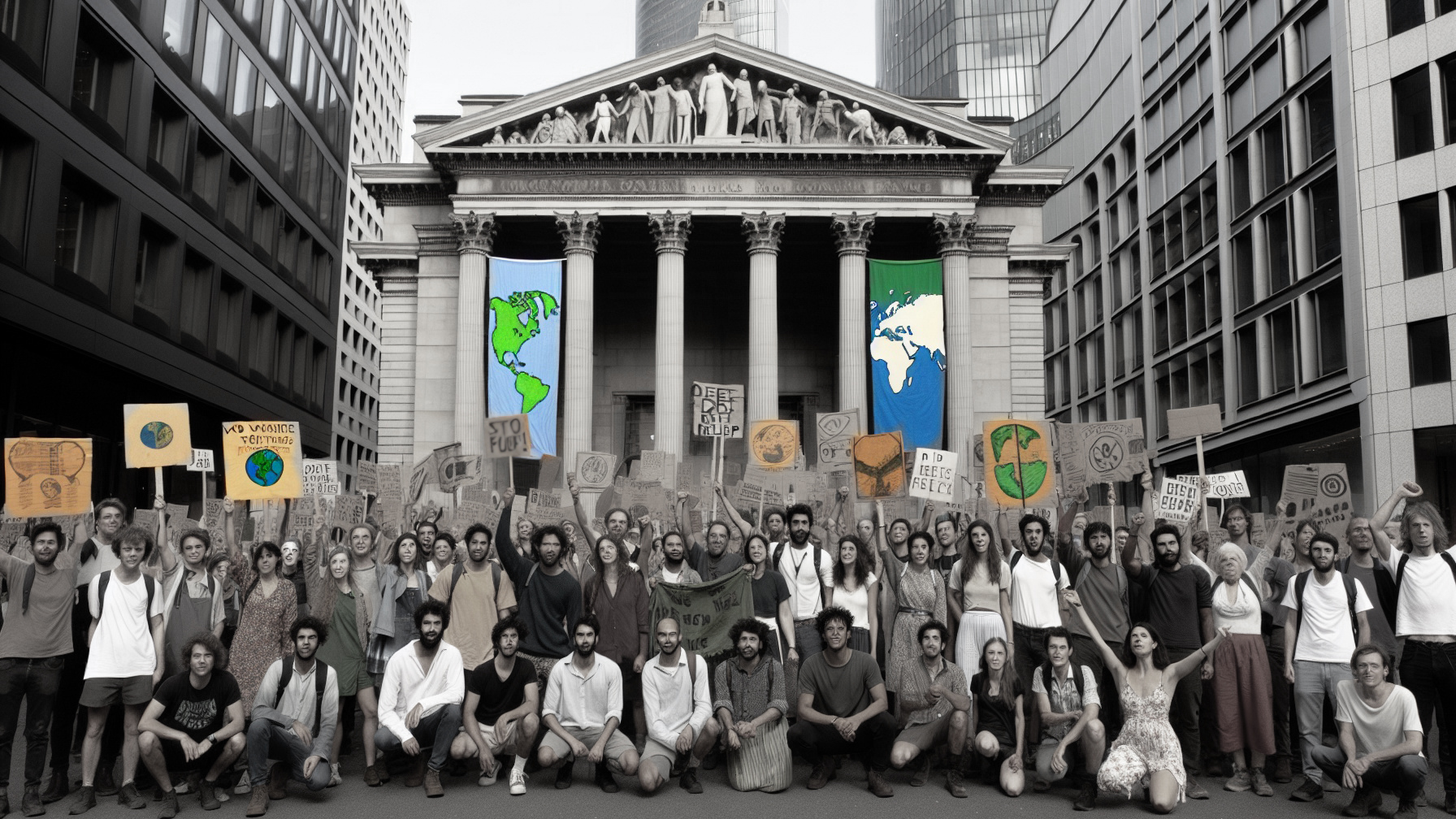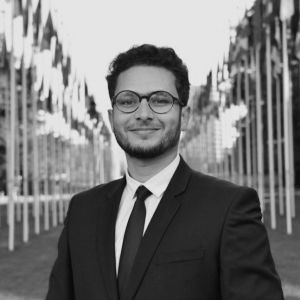
Decolonize and Democratize: The Urgent Need to Radically Transform the International Economic Architecture – Ayoub Menzli

Decolonize and Democratize: The Urgent Need to Radically Transform the International Economic Architecture – Ayoub Menzli
The modern global economic architecture, conceived in the crucible of colonial exploitation and perpetuated through the insidious mechanisms of post-colonial international finance, trade, and taxation, is fundamentally incompatible with the liberation of the oppressed peoples of the Global South. This architecture, steeped in the blood and sweat of subjugated nations, continues to uphold the structures of dependency and domination that stymie true development and self-determination. The purpose of this article is to highlight the necessity of a radical transformation that decolonizes and democratizes our economic systems to foster a future of genuine equality and justice. Yet, this path will encounter vehement resistance from those entrenched in the privileges of the status quo. Overcoming such resistance demands forging alliances and unifying diverse struggles into a cohesive force for change.
The Burden of Debt and Structural Inequalities
Today, 3.3 billion people live in countries that spend more on interest payments than on education or health (UNCTAD). This grotesque prioritization highlights how a world of debt disrupts prosperity for people and the planet. The burden of debt is not only a fiscal matter but a manifestation of deeper structural inequalities. Developing countries, forced to borrow in foreign currencies, are more exposed to external shocks, exacerbating their vulnerability. Furthermore, these countries pay exorbitantly higher interest rates compared to their wealthier counterparts. Respectively, Germany and the United States enjoy a borrowing rate of 1.5% and 3.1%, whereas countries in Asia and Oceania on one hand, and Latin America and the Caribbean on the other hand, pay 6.5% and 7.7%. Most staggeringly, African countries pay 11.6%, a rate four times higher than the US and eight times higher than Germany. This disparity underscores the systemic nature of economic oppression and the urgent need for Transformation.
The Legacy of Colonialism
Colonialism entrenched an economic order designed to extract and exploit; an order that persists in the Global South's assigned roles (Hickel). The Global South remains the reservoir of cheap raw materials, feeding the insatiable industrial appetites of the Global North. This forced dependency ensures that the economies of the South are forever shackled as mere suppliers, unable to ascend the value chain. Additionally, the South is treated as a vast dumping ground for the surplus industrial products of the North. This relationship stifles the growth of local industries, condemning the South to perpetual economic infancy. Furthermore, the North offloads its outdated technologies and labor-intensive manufacturing processes to the South, exploiting its cheap labor while denying it the benefits of technological advancement and innovation. These roles are not just economic positions; they are chains of oppression, designed to maintain the South in a state of perpetual subordination. True economic decolonization requires the destruction of these chains through transformative investments that address the root causes of this imposed dependency.
Addressing Structural Deficits
The burden of external debt in the Global South is not merely a fiscal problem but a manifestation of deeper structural deficits—deficits in food, energy, and value-added manufacturing. These deficits cripple fiscal sovereignty and make it nearly impossible for nations to invest in their own development. Chronic food shortages force nations to rely on imports, undermining their sovereignty and exposing them to global market volatility. Similarly, the lack of reliable, affordable energy sources shackles economic development and entrenches poverty. Dependence on imported fossil fuels exacerbates this vulnerability. The absence of robust manufacturing capabilities forces nations to remain exporters of raw materials and importers of finished goods, perpetuating economic dependence and debt.
The Climate Debt
The financial constraints of the Global South are further exacerbated by the colossal climate debt owed by the Global North. According to a recent study by Fanning and Hickel (2023), this debt is estimated to be $192 trillion. Instead of offering transformative climate reparations in the form of debt relief, grants, or the transfer of life-saving technology for climate adaptation, the Global North continues to exploit the Global South. The race to attract foreign direct investment (FDI) often results in a "race to the bottom" where developing nations are forced to lower labor and environmental standards to attract capital, further entrenching their subjugation.
Pathways to Economic Sovereignty
To address these structural deficits and reclaim economic sovereignty, strategic investments must be made in food sovereignty and agroecology. Moving beyond mere food security, food sovereignty empowers peoples to reclaim control over their food systems. Agroecological practices enhance sustainable production, improve nutrition, and reduce reliance on imports. Additionally, investing in renewable energy sources like solar and wind can dismantle energy deficits, reduce reliance on fossil fuels, and foster sustainable development. Developing high-value manufacturing sectors focused on clean energy, clean cooking technologies, and clean transportation infrastructure can drive industrialization and innovation in the Global South. These sectors not only generate jobs and economic prosperity but also promote environmental sustainability
Building Alliances for Change
The quest for economic decolonization will be fiercely contested by those who benefit from the current order. To overcome this resistance, a united front of diverse struggles is essential. Labor unions must champion workers' rights, advocating for fair wages, decent working conditions, and job security. By aligning with decolonization efforts, they can dismantle exploitative practices and promote equitable economic development. Civil society organizations (CSOs) play a crucial role in mobilizing grassroots support, raising awareness, and advocating for policy changes. They can bridge the gap between local communities and global policymakers, ensuring the voices of the marginalized are heard and considered. Academia provides the critical analysis and evidence needed to support transformative policies. Scholars can challenge dominant paradigms, propose alternative models, and educate future leaders on the importance of decolonizing and democratizing the global economy. Popular movements, advocating for climate justice, indigenous rights, and gender equality, are vital allies in the struggle for economic decolonization. These cross-cutting movements bring diverse perspectives and energies to the fight against systemic inequalities and environmental degradation.
Transforming the International Economic Architecture
The current governance structures of international financial institutions (IFIs) are skewed towards the Global North, concentrating decision-making power among a privileged few. The distribution of quotas among IMF member countries, which determines access to resources and voting rights, does not reflect today’s economic realities. For instance, India's GDP surpasses that of the UK, yet India's quota is only 2.75%, while the UK’s is 4.23%. Similarly, China’s economy is larger than Germany, Japan, and the UK combined, but China’s quota at the IMF is only 6.4%, compared to the combined 16.3% of these three countries. Such disparities exemplify the need for urgent transformation. Transforming these institutions to ensure equitable representation and accountability is crucial.
The governance structures of the IMF, World Bank, and other IFIs should be transformed to ensure developing countries have a meaningful voice in decision-making processes. For example, adopting a double majority rule, where decisions require both a majority of votes and a majority of member states, could prevent a minority of powerful countries from vetoing decisions supported by most member states. Additionally, access to IMF borrowing should be based on the needs of the countries rather than their quotas, and the policy of surcharges, which penalizes countries in need of more support, must be eliminated. Furthermore, representation at the decision-making level must be changed. Currently, the board of directors of the IMF is dominated by resident full-time directors from a minority of countries, allowing major creditor nations to use the institution to pursue their political objectives. In this way, the practice of having the President and Managing Director of the IMF always being American and European, respectively, further reinforces the institutionalized Global North dominance of financial institutions.
Conclusion
The current system, rooted in colonial legacies and dominated by the interests of the Global North, perpetuates economic inequality, social injustice, and environmental degradation. The urgent need to decolonize and democratize the international economic architecture is undeniable. Yet, achieving this vision requires overcoming entrenched resistance. Building alliances with labor unions, civil society organizations, academia, and popular movements is essential for creating the broad-based support needed to drive radical transformation. Only through decolonization and democratization can we create a global economic system that serves all humanity, promotes social justice, and ensures the well-being of our planet for future generations.
Ayoub Menzli
This article is part of a series written by participants of Global South Study Week 2024 and does not necessarily reflect the views of ANND.
References
“Forward Together: Navigating the Growing Challenges of Public and External Debt.” UNCTAD. Last modified June 8, 2024. https://unctad.org/news/forward-together-navigating-growing-challenges-public-and-external-debt#:~:text=Global%20public%20debt%20has%20doubled%20since%202010%2C%20reaching%20an%20all,than%20on%20education%20or%20health.
“A World of Debt: A Growing Burden to Global Prosperity” UNGCRG. Last modified July, 2023. https://unctad.org/system/files/official-document/osgmisc_2023d4_en.pdf
“The Global South Must Be at the Center of the Making of a Just Global Economic Order.” Last modified February 3, 2023. https://jacobin.com/2023/02/neoliberalism-global-south-finance-climate-washington-consensus.
“Commodity Dependence: 5 Things You Need to Know.” UNCTAD. Last modified October 9, 2023. https://unctad.org/news/commodity-dependence-5-things-you-need-know.
“Just Transition: A Climate, Energy and Development Vision For Africa” Sokona et al. Independent Expert Group on Just Transition and Development. Last modified May, 2023. https://justtransitionafrica.org/wp-content/uploads/2023/05/Just-Transition-Africa-report-ENG_single-pages.pdf
Fanning, Andrew L., and Jason Hickel. “Compensation for Atmospheric Appropriation.” Nature Sustainability 6, no. 9 (June 5, 2023): 1077–1086. https://www.nature.com/articles/s41893-023-01130-8.
Kaboub, Fadhel. “Climate Reparations, Not ‘Finance.’” Global South Perspectives ~ by Fadhel Kaboub, March 24, 2024. https://globalsouthperspectives.substack.com/p/climate-reparations-not-finance.
Olney, William W. “A Race to the Bottom? Employment Protection and Foreign Direct Investment.” Journal of International Economics 91, no. 2 (November 1, 2013): 191–203. https://www.sciencedirect.com/science/article/abs/pii/S0022199613000925#:~:text=More%20specifically%2C%20the%20race%20to,foreign%20direct%20investment%20(FDI).
Recent publications

